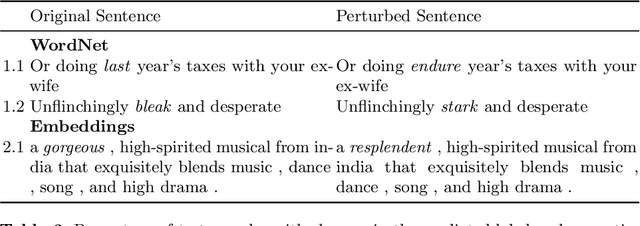Shriya Atmakuri
Robustness of Explanation Methods for NLP Models
Jun 24, 2022



Abstract:Explanation methods have emerged as an important tool to highlight the features responsible for the predictions of neural networks. There is mounting evidence that many explanation methods are rather unreliable and susceptible to malicious manipulations. In this paper, we particularly aim to understand the robustness of explanation methods in the context of text modality. We provide initial insights and results towards devising a successful adversarial attack against text explanations. To our knowledge, this is the first attempt to evaluate the adversarial robustness of an explanation method. Our experiments show the explanation method can be largely disturbed for up to 86% of the tested samples with small changes in the input sentence and its semantics.
Word2Box: Learning Word Representation Using Box Embeddings
Jun 28, 2021



Abstract:Learning vector representations for words is one of the most fundamental topics in NLP, capable of capturing syntactic and semantic relationships useful in a variety of downstream NLP tasks. Vector representations can be limiting, however, in that typical scoring such as dot product similarity intertwines position and magnitude of the vector in space. Exciting innovations in the space of representation learning have proposed alternative fundamental representations, such as distributions, hyperbolic vectors, or regions. Our model, Word2Box, takes a region-based approach to the problem of word representation, representing words as $n$-dimensional rectangles. These representations encode position and breadth independently and provide additional geometric operations such as intersection and containment which allow them to model co-occurrence patterns vectors struggle with. We demonstrate improved performance on various word similarity tasks, particularly on less common words, and perform a qualitative analysis exploring the additional unique expressivity provided by Word2Box.
 Add to Chrome
Add to Chrome Add to Firefox
Add to Firefox Add to Edge
Add to Edge